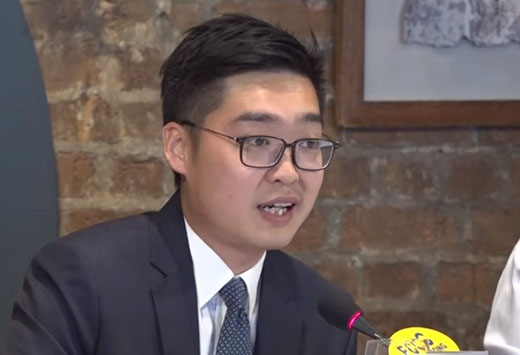by WorldTribune Staff, February 18, 2020
Hong Kong independence activist and Nobel Peace Prize nominee Andy Chan Ho-Tin condemned the Hong Kong government, which serves at the Chinese Communist Party’s whim, for refusing to close its border with China, greatly increasing the risk that the Wuhan coronavirus would spread in the autonomous territory.
As of Tuesday morning, Hong Kong had documented 58 Wuhan coronavirus cases and one death.

Chan noted that failing to close the borders prompted thousands of medical workers to go on strike, protesting that the government was not adequately caring for them.
Related: Hong Kong independence leader Andy Chan nominated for Nobel Peace Prize, February 16, 2020
Hong Kong Chief Executive Carrie Lam insisted on leaving three border crossings open, arguing that the links between Hong Kong and China are too strong to cut them completely, Chan said.
“This reminds Hong Kong people why we should pursue independence from China or we would be isolated by the world. All in all, the Wuhan coronavirus outbreak once again reminds us China is a serious threat to the world in many ways, that we should contain and isolate China. Hong Kongers have to distinguish ourselves apart from Chinese.”
Chan said that the protests in Hong Kong “will definitely come back when the coronavirus outbreak is over. And more people would join the protests, as the government has performed extremely poorly. The protests have cooled down a little bit and then the Wuhan coronavirus broke out. The coronavirus outbreak happened to multiply the effect of the protests. The economy is facing the worst challenge in a few decades.”
In the Breitbart interview, Chan also made the case that it is impossible to trust China to grant true autonomy via “One Country, Two Systems.” Beijing agreed to the policy in 1997, following the United Kingdom’s surrender of Hong Kong to China, vowing to respect capitalism and democracy in Hong Kong so long as Hong Kong did not try to secede and form its own country.
“When we deal with China, we must [be] aware that they always lie and do not obey the contracts,” Chan said. “Tibet, Xinjiang, and Inner Mongolia all are autonomous regions and they were promised to have autonomy. However, ‘autonomous regions’ means colonies in reality. People and culture are being erased from the soil.”
Chan continued: “’One Country, Two Systems’ is the same case. We were promised to have autonomy, but we are being colonized instead. The only way for Hong Kongers to achieve democracy is to become independent instead of seeking autonomy under the rule of China and falling into [Beijing’s] trap.”
The Nobel Committee confirmed this month that it had received Chan’s official nomination, submitted by Hidetoshi Ishii, vice president of the Free Indo-Pacific Alliance, and Professor Jason Michael Morgan of Japan’s Reitaku University. Nobel Peace Prize nominations must come from individuals meeting one of a set of criteria, among them university professors, members of national lawmaking bodies or governments, or prior winners of the Nobel Peace Prize.
Intelligence Brief __________ Replace The Media
